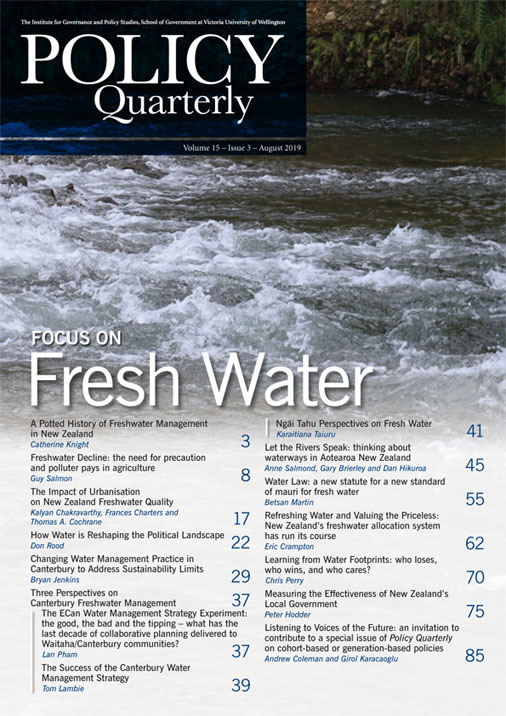Changing Water Management Practice in Canterbury to Address Sustainability Limits
DOI:
https://doi.org/10.26686/pq.v15i3.5685Keywords:
nested adaptive systems, collaborative governance, sustainability strategies, water resource management, community outcomesAbstract
Irrigation expansion in Canterbury has led to sustainability limits being reached for water availability and cumulative effects of land use intensification. Increasing water availability through storage was proposed, but there was strong community opposition to impacts of storage and further intensification. Effects-based institutional arrangements proved inadequate to address these issues. The regional council introduced a strategic approach based on nested adaptive systems and collaborative governance. A regional water strategy was developed through a multi-stakeholder steering group under the Canterbury Mayoral Forum and with extensive community engagement. Zone committees were established to develop zone implementation programmes. Farmer collectives are being established for operational delivery of water management targets. Farmers develop farm management plans to meet property-level outcomes, which are independently audited. Strategy investigations demonstrated that focusing on new development would not achieve sustainable development; rather, existing users also had to improve. Water use efficiency improvements were more cost-effective than new storage. Furthermore, different forms of storage, such as managed aquifer recharge, were identified to avoid adverse effects on main stems of alpine rivers. Proactive measures were needed to address water quality degradation, biodiversity loss, Mäori involvement and ecological restoration. A systems perspective and a governance change from regulatory to collaborative have improved water management. However, they also identified issues concerning affordability of proactive measures, equity in allocation, and need for a public infrastructure agency. Uneven implementation of measures has led to some groups withdrawing from the collaborative process.
Downloads
Downloads
Published
Issue
Section
License
Permission: In the interest of promoting debate and wider dissemination, the IGPS encourages use of all or part of the articles appearing in PQ, where there is no element of commercial gain. Appropriate acknowledgement of both author and source should be made in all cases. Please direct requests for permission to reprint articles from this publication to Policy-Quarterly@vuw.ac.nz.



